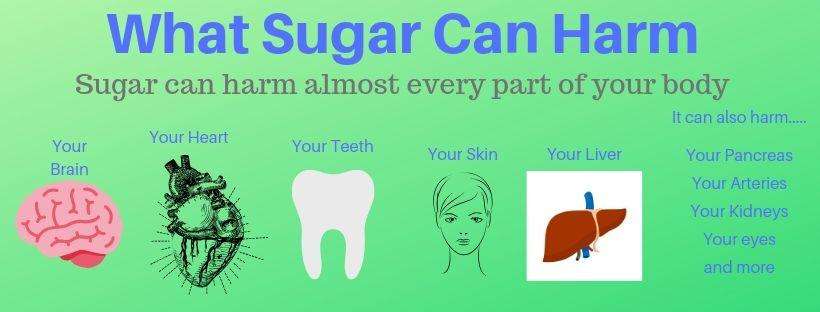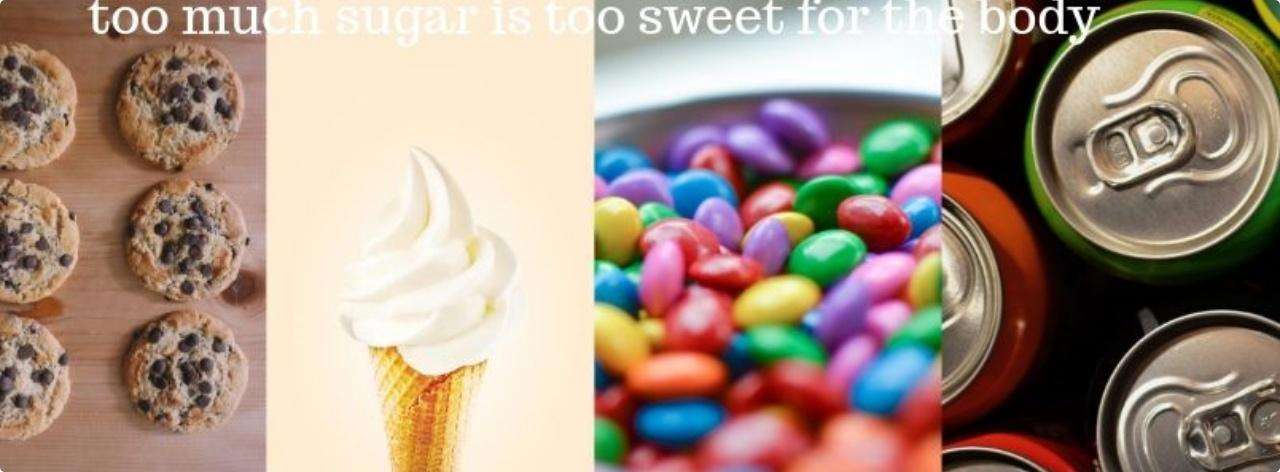Sugar carries a bad rep. But why? Why is it warned against? Why should you avoid it? The way that sweets impact the body is way more complex than only weight gain. Hopefully this article will bring some light to this topic and help people understand what EXACTLY sugar does that is so negative for the human body.
When a large amount of sugar is ingested almost every part of your body is impacted and feels the stress. Parts of your body such as your brain, liver, kidneys, pancreas, skin, heart, mouth, and more feel the affects! UC San Francisco conducted a study that discovered that drinking sugary drinks such as soda can age your body on a cellular level as quickly as cigarettes.
Your mouth is directly affected by ingesting sugar because it becomes a feeding ground for bacteria. Bacteria, such as Streptococcus mutans, eat the leftover sugar in your mouth. The bacteria ferments it into lactic acid, which dissolves the minerals in your teeth enamel. This is why your dentist might also be telling you to avoid sugar!
Sugar causes the brain to release dopamine and opioids which feel-good chemicals. Theses are the same chemicals that are released when using certain drugs. After this initial “high”, much like after drug use, your body craves more. Rats on high-sugar diets behave like drug addicts. Your brains response to sugar is the same as its response to cocaine.
The pancreas releases insulin once the blood sugar levels rise. Insulin absorbs the excess glucose in the blood to help lower the sugar levels back down. After the insulin secretion and your blood levels drop you typically experience a sugar crash. The blood sugar spiking is typically referred to as a sugar rush; the insulin lowering the blood sugar is the following sugar crash. After these events you typically feel mentally and physically drained.
Your liver also functions to regulate blood sugar levels. Your cells use the sugar in your blood (glucose) as energy. Your liver stores the excess glucose in the form of glycogen. This a good form of back up energy but your liver can only store so much. The excess storage builds up as fat in the liver. This can lead to a nonalcoholic fatty liver disease. Nonalcoholic fatty liver disease is when your body contains more fat than it can metabolize. Although with this disease-sugar isn’t the only cause but storage of sugar in the liver is a large reason. If this disease progresses it can eventually lead to liver failure in the future.
If you have blood with high sugar levels it can also damage almost every other organ as it travels through your entire body. The small blood vessels carrying blood with high sugar levels will eventually get tired. Areas in your body relying on small blood vessels to carry blood to them (kidneys, brain, heart, eyes) become affected. High insulin levels in the blood can cause the smooth muscle cells around the artery walls in your heart to grow faster which raises blood pressure. This can eventually lead to heart disease.
Sugar also affects your skin. Glucose and fructose attach to proteins such as collagen and elastin making it harder for these proteins to repair themselves. This process of glucose attaching itself is referred to as glycation, which results in wrinkles and other signs of aging.

Overall there are hundreds of reasons to avoid sugar. You have probably been warned about sugar before but it is always important to know the different harms it can cause to your body. Maybe rethink those sugary drinks? It’s amazing to learn about the harms that something in your everyday life and diet can cause you. There is no “right” amount of sugar that you should be ingesting. It is difficult to cut back on sugar completely but it is never too late to start. Added sugar can be found in so many foods that you’re unaware of. Start with reading the nutrition labels and make yourself aware of what you are doing to your body. Take care of your body and it will take care of you!

























